The United States signed the Operational Work Plan for potato exports, fresh for consumption or processing, to Mexico.
With this, both countries will establish the phytosanitary measures that will allow imports into Mexico and prevent the introduction of pests of quarantine concern to Mexico associated with the importation of this product, guaranteeing the phytosanitary condition of shipments and facilitating trade.
Potato exports
The two countries agreed to end restrictions on Mexican foreign purchases of U.S. potatoes, which led to a 25-year trade dispute.
In 2021, U.S. exports of fresh potatoes to the world totaled US$276 million, with shipments to Mexico totaling US$50 million.
The value of U.S. potato production exceeds $4.5 billion annually and supports hundreds of thousands of jobs, both directly and indirectly.
Other products
Through actions to regulate and coordinate phytosanitary aspects for the importation of vegetables and their products, from September 1, 2021 to June 30, 2022, in order to protect Mexico’s plant products and thus strengthen the country’s health, the Ministry of Agriculture established new phytosanitary measures for the entry of goods from abroad, such as tomato and chili seeds from Brazil; cabbage, kale and crotalaria from Spain; broccoli from Australia, as well as fresh cape gooseberry fruit from Colombia.
Nutrition
The potato is a versatile food and has a high carbohydrate content, is popular around the world and is prepared and served in a variety of ways.
According to Conpapa, freshly harvested potatoes contain 80% water and 20 % dry matter.
Between 60 and 80% of this dry matter is starch. In terms of dry weight, the protein content of the potato is analogous to that of cereals, and is very high compared to other roots and tubers.
In addition, potatoes are low in fat. Potatoes have abundant micronutrients, especially vitamin C: an average potato, 150 grams, consumed with its skin, provides almost half of the daily adult requirement (100 mg).
Potatoes contain a moderate amount of iron, but the high vitamin C content promotes the absorption of this mineral.
Also, this tuber has vitamins B1, B3 and B6, and other minerals such as potassium, phosphorus and magnesium, as well as folate, pantothenic acid and riboflavin.
It also contains dietary antioxidants, which can help prevent diseases related to aging, and has fiber, whose consumption is good for health.
![]()

